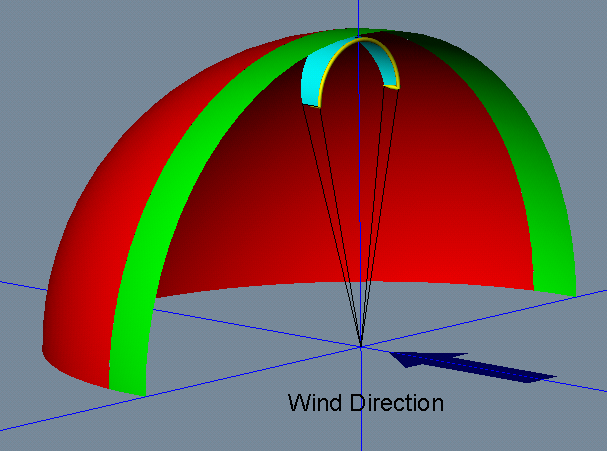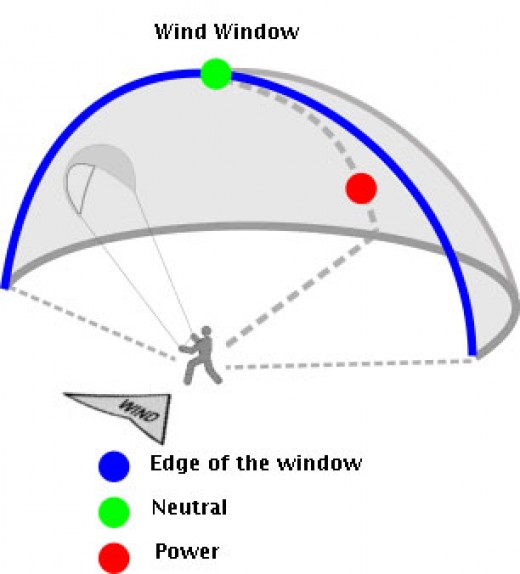Epic Attack video
Epic Attack video
Dimitri Maramenides showing what kiteboarding is all about.
This is one of our favourite disciplines, impressive big air and hooked tricks. ENJOY IT!!
EPIC ATTACK 5 Most wanted from EPIC KITES on Vimeo.
Dimitri Maramenides showing what kiteboarding is all about.
This is one of our favourite disciplines, impressive big air and hooked tricks. ENJOY IT!!
EPIC ATTACK 5 Most wanted from EPIC KITES on Vimeo.
The WInd window is something that all kiters understand and master. If you are a beginner, spend some time to understand it and have it really clear since this is the theory for all that is going to happen in the next lessons.
Some students do not pay special attention to this part, since they think it is theoretical and boring. This is a huge mistake because if they do not have this super clear the will do mistakes once they have a real kite in their hands.
To make it simple:
Lets see it in the following drawing:


An another way to explain it:
In the power zone, the kite is more directly in contact with wind. At the edge, the wind “sees” only the semi-circular arc shape, and produces minimal pressure changes over the kite so the power is kept at bay. In the power zone, the kite’s wind profile is larger and pressure changes are more extreme, causing the kite to generate enough power to easily lift you off the ground, or drag you across a field. It is very important to first get lessons, or use a trainer kite (which is very small and generates minimal power in the middle of the power zone) to get used to the forces of the wind on the kite before going out with a kite that can generate enough power to lift you off the ground.
In CostaKite we will teach you all this things efficiently so that you get the most out of your kite course!!
Come and learn with us in Costa Rica!! Kiteboarding is our passion!!
Check out this amazing video:
SAME BUT ≠
SAME BUT ≠ from Mps on Vimeo.
Hugo Guias and Mallory de la Villemarqué, feature in this video sponsored by Takoon.
The spot is in turkey.
First of all we have to mention 2 main rules:
Golden rule: If you are passing upwind, keep your kite HIGH.
If you are passing downwind, keep your kite LOW.
Common sense rule: Remember to use common sense when applying the rules and stay clear from other riders whenever possible!
The rider entering the water from the beach has right of way over the incoming rider. Why? 95% of accidents happen on the land.

The rider with their right hand and shoulder forwards has priority over the oncoming rider (left hand and shoulder forwards) and should keep their course. The rider with their left hand and shoulder forwards should give way and alter their course downwind. Why? To avoid a collision.
When two riders are travelling in the same direction, the faster rider coming up from behind must give way to the slower rider in front. Why? The slower rider will find it difficult to see the rider behind them.
The rider surfing a wave has priority over the one who is jumping or going in the opposite direction. Why? When surfing a wave, it is more difficult to maneuver the kite.
Right of way must be given to other ocean and beach users. Kiteboarders must travel downwind of them.
Why? Regular ocean and beach users may not understand the behaviour and dangers of kiteboarding.
To jump, a rider must have a clear safety zone of 50m downwind and 30m upwind.
Why? When a rider jumps they travel downwind.
Costa Kite Kitesurfing in Costa Rica – Kiteboarding – Kitesurfing lessons Costa Rica – Kitesurfing holidays – Kitesurfing vacations – Kitesurfing packages – Kiteboarding trip Costa Rica – Kiteboarding lessons – Kiteboarding in Central America – Kitesurfing spot
